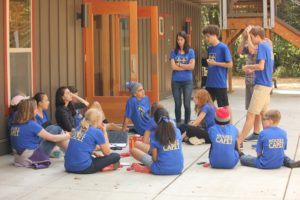27 Sep What is the Role of the Dean of Students?
What is the Role of the Dean of Students?
by Joe Haferbecker, Dean of Students
This year I find myself in the position of Dean of Students. As I have told many people, this was not a position that I sought out. I am now in my ninth year at St. Stephen’s, and there have been two deans before me. It would appear that now my time has come. This was God’s idea, and God’s timing, and I am excited to take on the challenges of this position with His strength as my foundation.
Over the summer I sat down and wrote some statements that I believe should characterize the role of the Dean of Students:
- Strives to develop independence and maturity in the students by engaging them as young adults
- Works as an advocate and a source of support for the students
- Remains open to student feedback about the culture of the school and about student life experience
- Comes alongside students to guide and support, trying to avoid the dynamic of being a top-down enforcer of expectations
- Facilitates growth in the students by respecting their process of growing into adults
- Encourages student leadership as a means of helping students to grow and mature
- Takes the long view, not expecting all students to reach the same level of maturity or leadership, realizing that the life of each student is God’s work and continues well beyond the walls of SSA
Naturally, there are more statements that could be made, but these are some that I feel are of particular importance. With these kinds of goals in mind, I also oversee the key events that intersect with student life. I work to organize high-quality, well-run student life events that connect the students to each other and to the school. These include assembly, all things related to the House System, our Protocol program, our Reformation Day celebration, and our high school trips.
Another practical matter that I oversee is students discipline. It is my job to uphold discipline policies that are well-founded and well-communicated. To this end I have worked this year to create a South Campus Handbook that both address the details of what it looks like to live in an orderly manner as well as the principles under which we operate here in the Upper School.
Setting up principles, and then living through the process with the students, is how I intend to operate. It isn’t about defining all the nuances of what constitutes an infraction. That approach not only violates the principle of principles, but it puts faculty on the defensive from the beginning, and suggests an underlying mistrust of the students.We can’t begin with the expectation that they are aiming to make bad choices, even though sometimes they may. It is all an opportunity to be a part of their growth.
Especially with the older students, we need to give them the chance to grow and mature into the young people they are becoming, and they cannot do that if all our efforts limit their opportunities to apply wisdom and discernment. Our goal can’t simply be behavior restriction and behavior modification. We have to deal in the messy reality of working with growing human beings, extending the same grace that is being extended to us, the adults who are still growing as well.



